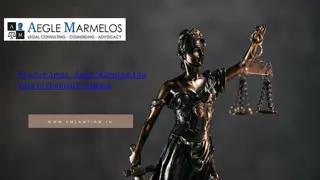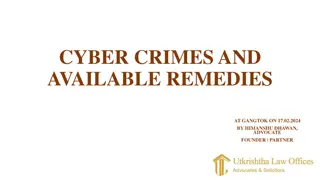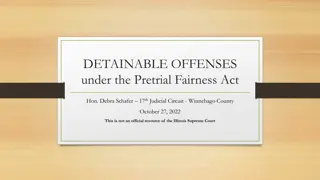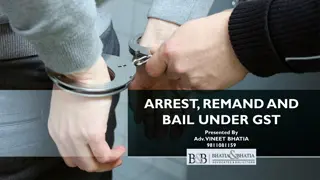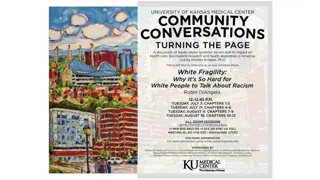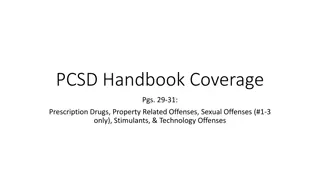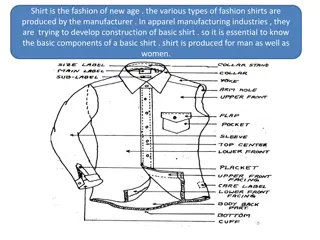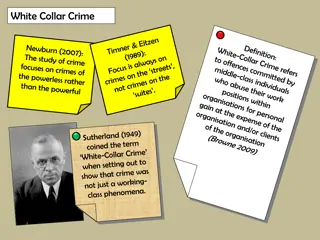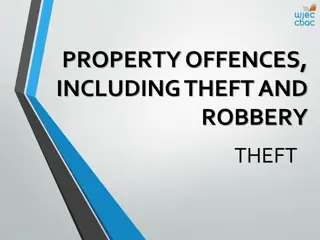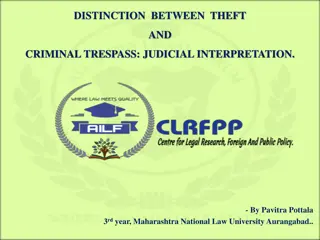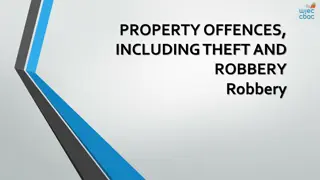Understanding White-Collar Crimes and Theft Offenses
Exploring the world of white-collar crimes and theft offenses, including common examples like embezzlement and fraud. Learn about larceny, robbery, burglary, and more, with insights on criminal acts, required state of mind, and motives behind such offenses.
Download Presentation

Please find below an Image/Link to download the presentation.
The content on the website is provided AS IS for your information and personal use only. It may not be sold, licensed, or shared on other websites without obtaining consent from the author. Download presentation by click this link. If you encounter any issues during the download, it is possible that the publisher has removed the file from their server.
E N D
Presentation Transcript
Davis, the Chief Accountant of the Del Norte Credit Union, cleverly juggled the company records over a period of years. During that time, she took at least $35,000 belonging to the credit union. When the theft was discovered by outside auditors, Davis repaid the money with interest. Has she committed a crime despite the repayment? Criminal Act? Required State of Mind? Motive?
Business-Related Crimes
White-Collar Crimes Offenses committed in the business world. DO NOT involve force or violence DO NOT cause injury to people DO NOT cause physical damage to property
Common Examples of White-Collar Crimes Evading Income Taxes Defrauding Consumers Cheating with False Weighing Machines Conspiring to Fix Prices Making False Fire & Auto Insurance Claims Engaging in False Advertising Committing Bribery Engaging in Political Corruption Embezzling
Larceny Also known as Theft. The Wrongful taking of money or personal property belonging to someone else, with intent to deprive the owner of possession.
Variations of Larceny Robbery Burglary Shoplifting Pick-Pocketing Purse Snatching
Robbery The taking of property from another s person or immediate presence, against the victim s will, by force or by causing fear.
Burglary Entering a building without permission when intending to commit a crime.
Receiving Stolen Property Receiving or buying property known to be stolen, with the intent to deprive the rightful owner of the property.
False Pretenses Obtaining money or other property by lying about a past or existing fact (fraud).
Forgery Falsely making or materially altering a writing to defraud another.
Bribery The unlawfully offering or giving anything of value to influence performance of an official.
Extortion Commonly known as Blackmail. Obtaining money or other property from a person by wrongful use of force, fear, or power of office.
Conspiracy An agreement between two or more persons to commit a crime.
Arson The willful and illegal burning of a building.
Computer Crime The computer revolution has created a range of problems for criminal law. Is loading a computer program onto your computer, when the program is licensed to someone else a crime?
Whats Your Verdict???
Officers of six competing cosmetics manufacturers met at a Trade Convention. All of the officers agreed to use the same wholesale prices. They also agreed to follow the lead of the biggest company in making future price changes. Each officer agreed to promote sales by advertising only within an assigned geographical region. Were the officers and their companies guilty of any crime?
How are you personally hurt by crimes such as those committed by business people?
If a student pays their teacher to give them a higher grade, would this be bribery? Is this a criminal offense?
Phillips developed a scheme to generate funds by sending bogus bills for a relatively small amount for District Sanitation Service to residents of certain affluent neighborhoods. Enough people paid these bills to make the practice quite profitable. Has Phillips committed a crime? If so, what crime?
A corporation was cited and charged with illegal pollution for dumping chemical wastes into a river. The dumping happened when an employee mistakenly opened the wrong valve. The company pleaded not guilty because the dumping was not intentional. Neither the company nor the employer knew the ban on dumping this particular chemical. Is either argument a good defense?


![Prevention and Combating of Hate Crimes and Hate Speech Bill [B.9B.2018]](/thumb/60513/prevention-and-combating-of-hate-crimes-and-hate-speech-bill-b-9b-2018.jpg)
